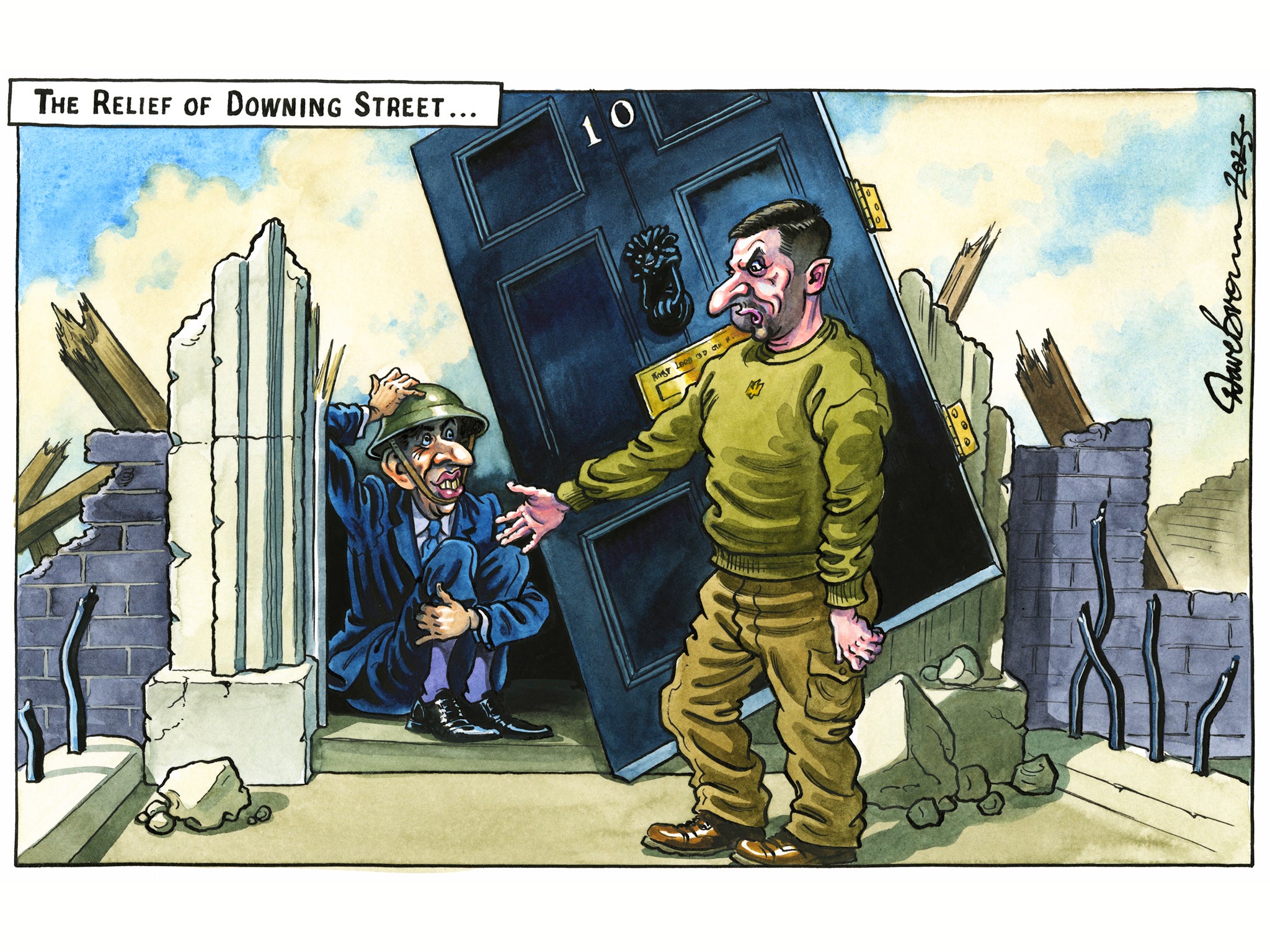It is entirely fitting, as well as a signal honour, that Volodymyr Zelensky’s second visit abroad since Russia invaded his country should be to the UK. America’s financial, technological and military assistance has naturally dwarfed other contributions, but Britain has led in supplying intelligence and weaponry and was one of the first powers to respond to Kyiv’s cries for help when the Russians came rolling over the border.
It would be churlish to deny the role played in that effort by Boris Johnson and Ben Wallace, in particular, and the way, through example, they galvanised the West’s response a year ago and more, when others either dismissed the possibility of Russian aggression, blamed Nato for “poking the Russian bear” or writing off Ukraine’s chances of surviving more than a few weeks. His leadership in that period was one of the few things Mr Johnson may count as an unalloyed success; any personal political capital he extracts from it was and is a price worth paying.
The policy has been continued by Mr Johnson’s successors and enjoyed cross-party and broad national support. Thousands of Ukrainian refugees have been made welcome in British homes, though more can always be done. Most recently, that commitment has been demonstrated once again in the early pledge of Challenger 2 battle tanks, and, now, in the training Ukrainian pilots in modern Western fighter jets. The Challenger tank initiative, with the promise of US Abrams tanks, succeeded in making the German government budge and relax its restrictions on the export of its Leopard tanks.
President Zelensky was generous in his thanks for British support. But the UK, the West and the free world as whole has much cause to thank President Zelensky and the brave Ukrainian people. The miseries and murders they have suffered in the past year are scarcely comprehensible. Defeated time and again on the battlefield, driven back and humiliated, Vladimir Putin’s forces have turned to indiscriminate attacks on civilian targets and the use of lawless, merciless Wagner Group mercenaries to prevent a total rout. He treats the lives of Russian soldiers, including ethnic minorities, as worthless cannon fodder. Badly-led and poorly equipped, they only have the edge on the Ukrainians in sheer numbers.
Soon, they will seek to make numbers count, and a fresh Russian offensive will come. The Kremlin has been regrouping. There is talk of perhaps 500,000 troops being amassed. The Russians have some more modern tanks of their own, the T90s. They will be making more drones. They will continue to target civilian populations. They are proving more adept at evading sanctions and exporting oil: China and India have been too helpful to Moscow.
So, Ukraine will need even more help in the coming months. After London, Mr Zelensky travelled to Paris, where he met with Macron and Scholz. He will then go to Brussels, where he is assured of another warm welcome. Essentially, though Mr Zelensky also needs to focus on an uncertain Berlin. For historic and industrial reasons, Germany has been understandably reluctant to become embroiled in the Ukraine conflict. It has paid a heavier price than most, in inflation and energy sanctions, but in the end Germany has done the right thing.
As the leading European industrial power, it now needs to support the Western effort still further, diplomatically and practically. That means fighter jets – from the UK, the rest of Europe, the US and allies across the globe. That is what Mr Zelensky has travelled West to secure: The inscription on the Ukrainian fighter pilot’s helmet presented to Speaker Hoyle reads “combat aircraft for Ukraine, wings for freedom.” The message is clear.
Air power is the next task, because the usefulness of the vast quantity of munitions, missile systems, artillery, tanks and armoured vehicles depends in part on adequate control of the skies. It is the one area where Ukraine remains at a relative technological disadvantage, and an absolute numerical one. Air power is the final element in the armoury that will be needed to push the Russians out of Ukraine and defeat them.
As President Zelensky said, “victory will change the world”. When this conflict is resolved, Russia can then be rehabilitated, live in peace with this neighbours, rebuild its economy and democratic institutions, and be treated with due respect in the community of nations. When that happens, the whole world will be a safer place – but especially Europe. That is the prize that awaits.
This is a critical moment. One year ago, on the eve of invasion, few would have given the Ukrainians much chance of resisting, let alone actually beating the Russians. Now it is an entirely realistic ambition. This is the moment, to borrow the Churchillian phrase, to give the Ukrainians the tools to finish the job. We cannot allow weakness or hesitation to snatch defeat from the jaws of victory.




Join our commenting forum
Join thought-provoking conversations, follow other Independent readers and see their replies
Comments